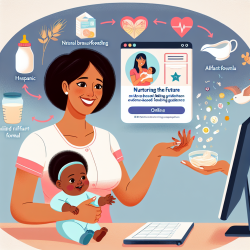Understanding the Role of Empirical Data in Enhancing Online Therapy Services
In the field of speech-language pathology, particularly within online therapy services like those offered by TinyEYE, the utilization of empirical data is paramount. The research article "Uses and Limits of Empirical Data in Measuring and Modeling Human Lead Exposure" by Mushak (1998) provides valuable insights that can be adapted to improve therapeutic practices.
The Importance of Empirical Data
Empirical data, derived from observation or experimentation, forms the backbone of evidence-based practice. In the context of lead exposure, empirical studies have been instrumental in understanding physiological and biokinetic parameters. This approach is equally applicable in online therapy, where data-driven decisions can significantly enhance the effectiveness of interventions.
Applying Research Insights to Online Therapy
According to Mushak (1998), empirical data should be fully understood and evaluated before being used as standards in modeling approaches. This principle can be applied to online therapy services in the following ways:
- Assessment and Evaluation: Use empirical data to develop comprehensive assessment tools that accurately capture a child's speech and language abilities. This ensures that interventions are tailored to meet individual needs.
- Modeling Outcomes: Just as lead exposure models are evaluated against empirical data, therapy outcomes should be modeled and validated using robust datasets. This helps in predicting the success of therapeutic interventions.
- Continuous Improvement: Regularly update therapy models and practices based on the latest empirical research. This ensures that services remain cutting-edge and effective.
Encouraging Further Research
The article highlights the necessity of understanding the limitations of empirical data. In online therapy, practitioners should be encouraged to conduct further research to identify potential gaps in existing models and data. This proactive approach fosters innovation and enhances service delivery.
Conclusion
By integrating empirical data into online therapy practices, practitioners can make informed decisions that lead to better outcomes for children. The insights from Mushak's research provide a framework for understanding the complexities of data-driven decision-making and underscore the importance of continuous learning and adaptation.
To read the original research paper, please follow this link: Uses and limits of empirical data in measuring and modeling human lead exposure.










